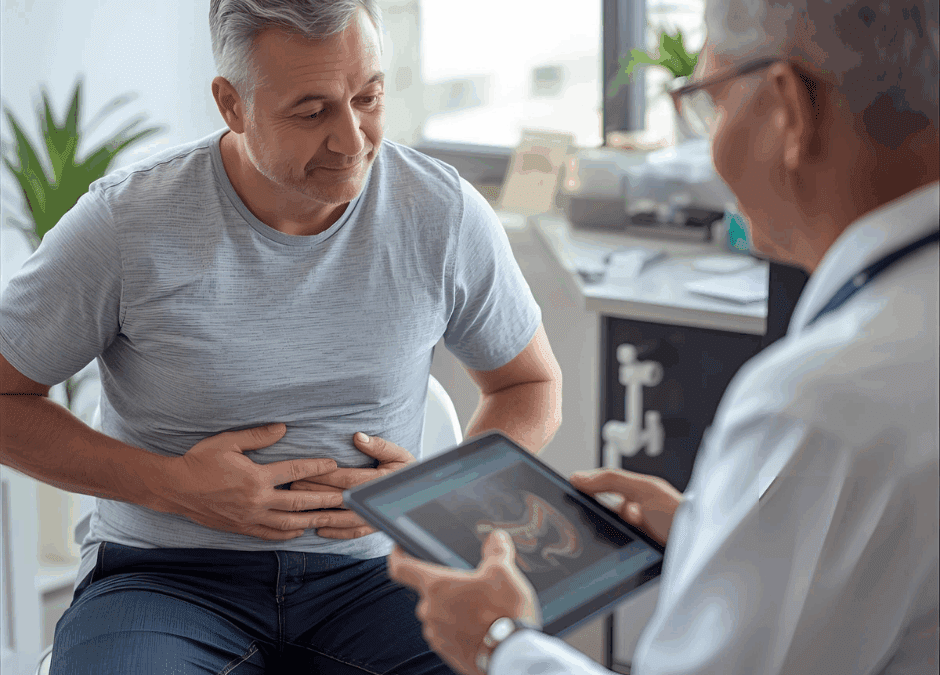Medical Review: Dr. Gerald Mastaw, MD – Board-Certified Physician
Last Updated: October 2025
Understanding IBD
Inflammatory Bowel Disease (IBD) is a chronic inflammatory condition of the digestive tract.
The two primary types are:
- Crohn’s disease: Inflammation can appear anywhere in the gastrointestinal (GI) tract, often in patchy segments.
- Ulcerative colitis: Involves continuous inflammation of the colon and rectum.
Common Symptoms
- Abdominal pain or cramping
- Frequent or urgent bowel movements
- Diarrhea (sometimes with blood)
- Fatigue and weight changes
- Cycles of flares (active inflammation) and remission (calmer periods)
Triggers can vary from person to person, stress, infections, or dietary sensitivities often play a role.
IBD is not the same as IBS.
Unlike irritable bowel syndrome, IBD causes visible inflammation and tissue damage to the intestinal lining.
Diagnosis
IBD is diagnosed through:
- Colonoscopy and biopsy to confirm inflammation
- Imaging (CT, MRI, or capsule studies) to assess the extent of disease
- Stool and blood tests (e.g., calprotectin, CRP) to monitor inflammation and response to therapy
How IBD Is Treated Today
Current management focuses on controlling inflammation, relieving symptoms, and preventing flares.
Conventional Treatment Options
- Medications: Aminosalicylates, corticosteroids, immunomodulators, biologics (anti-TNF, anti-integrin, anti-IL-23), or newer oral JAK inhibitors.
- Lifestyle and nutrition: Gentle diet adjustments during flares, hydration, stress management, and smoking cessation (especially important in Crohn’s).
- Procedures and surgery: Reserved for complications such as strictures, fistulas, or severe disease unresponsive to medication.
- Ongoing monitoring: Colonoscopies and lab work guide treatment and watch for recurrence or precancerous changes.
These therapies can be life-changing, but many patients still experience persistent inflammation or side effects that limit long-term control.
Where Regenerative Medicine May Help
Regenerative medicine seeks to calm the immune system, reduce inflammation, and promote repair of the damaged gut lining, addressing the root cause of IBD rather than just symptoms.
Umbilical Cord Tissue-Derived Mesenchymal Stem Cells (UCT-MSCs)
What they are: Cells isolated from donated umbilical cord tissue after healthy, full-term births.
Why they’re being studied:
- Modulate overactive immune responses
- Release anti-inflammatory growth factors and cytokines
- Encourage the development of regulatory immune cells
- Support repair and regeneration of intestinal tissues
How they’re administered:
- Most studies use IV infusions to deliver MSCs systemically.
- In select Crohn’s cases, cells are placed locally around perianal fistulas to promote healing.
What to expect:
- Protocols vary by trial but generally involve a series of infusions followed by routine monitoring.
- Studies report good tolerability, with minimal adverse effects.
Important:
UCT-MSC therapy for Crohn’s disease or ulcerative colitis is investigational and not FDA-approved.
It is considered a research-based or adjunctive option for patients who have not fully responded to standard treatments.
Recent Clinical Studies on Regenerative Medicine for IBD
2025 – Meta-Analysis on MSC Therapy for Perianal Crohn’s Disease
Title: Efficacy of Mesenchymal Stem Cell-Based Therapies in Perianal Fistulizing Crohn’s Disease: A Systematic Review and Meta-Analysis
Journal: Stem Cell Research & Therapy – Full Text
Summary:
A 2025 review of 25 studies (596 patients) found MSC therapy significantly improved fistula healing rates.
By 6 months, 58% achieved remission (complete closure and no abscess on MRI), a major improvement over placebo.
Benefits persisted up to 12 months, and no serious safety concerns were reported.
Researchers concluded MSC therapy is effective and well-tolerated for refractory perianal Crohn’s disease.
2024 – UC-MSC Infusions for Ulcerative Colitis
Title: Safety and Potential Efficacy of Expanded Umbilical Cord-Derived MSCs in Ulcerative Colitis
Journal: PubMed Central – Full Text
Summary:
Six adults with active UC received three IV infusions of UC-MSCs (100 million cells each).
No serious adverse events occurred over two years of follow-up.
Three of five patients achieved complete clinical remission (Mayo score 0) and discontinued all medications.
The authors concluded UC-MSC therapy may safely induce long-term remission in select ulcerative colitis patients.
2024 – UC-MSC Therapy for Crohn’s Disease Ulcers
Title: Researchers Investigate Use of Umbilical Cord Stem Cells for Crohn’s Disease
Location: Shanghai Clinical Pilot Study – Read Article
Summary:
Seventeen Crohn’s patients unresponsive to other treatments received local and IV UC-MSC therapy.
After 24 weeks, 47% showed major endoscopic improvement and 18% achieved full mucosal healing.
Inflammation markers dropped, and all patients entered clinical remission with no serious adverse effects.
Researchers found UC-MSC therapy helped restore intestinal lining integrity and immune balance.
Could Regenerative Therapy Be an Option for You?
You may wish to explore regenerative medicine if you:
- Have Crohn’s disease or ulcerative colitis that isn’t fully controlled with medications
- Experience frequent flares or medication side effects
- Want an adjunctive option focused on calming inflammation and promoting healing
At Stemedix, we focus on evidence-based regenerative care designed to complement, not replace, conventional treatment.
Our team will review your medical history, current therapies, and goals to determine whether regenerative therapy could fit within your comprehensive IBD management plan.
Medical Disclaimer
This page is for educational purposes only and does not constitute medical advice.
Stem cell therapy for inflammatory bowel disease is not FDA-approved, and individual results may vary.
Always consult a gastroenterologist or qualified healthcare provider before pursuing new treatments.
References
- Zhang L. et al. Efficacy of MSC-Based Therapies in Perianal Crohn’s Disease: A Systematic Review. Stem Cell Res Ther., 2025. Full Text
- Naser R. et al. Expanded UC-Derived MSCs in Ulcerative Colitis. PubMed Central., 2024. Full Text
- Li J. et al. Umbilical Cord Stem Cells for Crohn’s Disease. Shanghai Clinical Pilot., 2024. Full Text


 St. Petersburg, Florida
St. Petersburg, Florida
